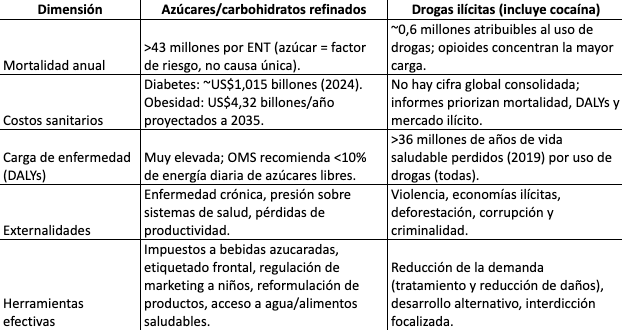Data from the World Health Organization (WHO), the United Nations Office on Drugs and Crime (UNODC), the International Diabetes Federation (IDF), and the World Obesity Federation (WOF) allow us to compare two chains with very different global impacts: that of diets high in sugars and refined carbohydrates, and that of the use of illicit drugs such as cocaine.
Noncommunicable diseases (NCDs) account for the majority of preventable mortality worldwide. In 2021, more than 43 million people died from these causes. Among their determinants, unhealthy dietary patterns—including excessive consumption of free sugars—significantly increase the risk of obesity, insulin resistance, and type 2 diabetes. These conditions generate high levels of healthcare costs and lost productivity.

The economic impact of these diseases is evident. The IDF estimated that diabetes will require approximately $1.015 trillion in global health spending in 2024, about 12% of global health expenditure. The World Obesity Federation projects that the economic cost of overweight and obesity will exceed $4.32 trillion annually by 2035, equivalent to 3% of global GDP. These figures show that the problem associated with excessive sugar consumption is systemic in magnitude.

By comparison, psychoactive drug use is linked to approximately 0.6 million deaths annually, according to the WHO, with the largest burden attributed to opioids. The share of cocaine use is smaller and varies by region. The UNODC estimates that approximately 25 million people were problem cocaine users in 2023, in a market reaching historic levels. Although the social and security harm is high, the health scale is lower than that of diet-related NCDs.
In terms of public policy, effective strategies against sugar include taxes on sugary drinks, visible warnings on packaging, and restrictions on advertising directed at children. These measures have been shown to reduce consumption and generate fiscal resources for prevention and care. Regarding drugs, international organizations recommend prioritizing public health, harm reduction, and alternative development in producing regions, complemented by targeted security actions.
The conclusion is clear: in terms of health and healthcare costs, the burden resulting from diets high in sugars and refined carbohydrates is orders of magnitude greater than that directly attributable to illicit drug use. However, the coca and cocaine chain generates specific harms to security and governance that make it a distinct problem. Both phenomena require differentiated, evidence-based policies with a comprehensive approach.
Sources cited: - WHO – NCD Fact Sheet: https://www.who.int/news-room/fact-sheets/detail/noncommunicable-diseases - WHO – Sugar Recommendations: https://www.who.int/publications/i/item/9789241549028 - PAHO/WHO – NCDs (regional summary): https://www.paho.org/en/topics/noncommunicable-diseases - IDF – Diabetes Atlas (health expenditure 2024): https://diabetesatlas.org/ - World Obesity Federation – World Obesity Atlas: https://data.worldobesity.org/publications/WOF-Obesity-Atlas-V5.pdf - WHO – Alcohol and Drugs Note 2024: https://www.who.int/news/item/25-06-2024-over-3-million-annual-deaths-due-to-alcohol-and-drug-use-majority-among-men - UNODC – World Drug Report 2024: https://www.unodc.org/unodc/data-and-analysis/world-drug-report-2024.html
